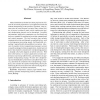Free Online Productivity Tools
i2Speak
i2Symbol
i2OCR
iTex2Img
iWeb2Print
iWeb2Shot
i2Type
iPdf2Split
iPdf2Merge
i2Bopomofo
i2Arabic
i2Style
i2Image
i2PDF
iLatex2Rtf
Sci2ools
113
click to vote
SRDS
2003
IEEE
2003
IEEE
Performance and Effectiveness Analysis of Checkpointing in Mobile Environments
Many mathematical models have been proposed to evaluate the execution performance of an application with and without checkpointing in the presence of failures. They assume that the total program execution time without failure is known in advance, under which condition the optimal checkpointing interval can be determined. In mobile environments, application components are distributed and tasks are computed by sending and receiving computational and control messages. The total execution time includes communication time and depends on multiple factors, such as heterogeneous processing speeds, link bandwidth, etc., making it unpredictable during different executions. However, the number of total computational messages received is usually unchanged withinan application. Another special factor that should be considered for checkpointing purpose is handoff, which often happens in mobile networks. With these observations, we analyze application execution performance and average effectiveness,...
Related Content
| Added | 05 Jul 2010 |
| Updated | 05 Jul 2010 |
| Type | Conference |
| Year | 2003 |
| Where | SRDS |
| Authors | Xinyu Chen, Michael R. Lyu |
Comments (0)

